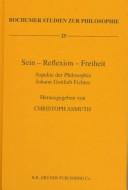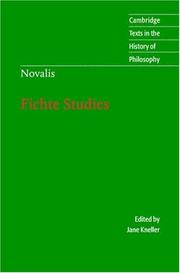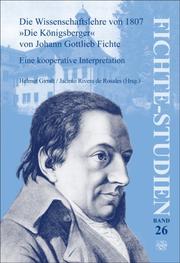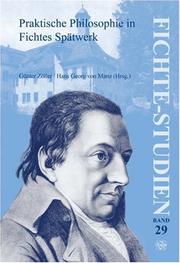| Listing 1 - 10 of 55 | << page >> |
Sort by
|
Book
ISBN: 9783110245295 3110245299 9783110245288 3110245280 1282784196 9781282784192 9786612784194 6612784199 3110481707 Year: 2010 Publisher: Berlin ; New York Walter de Gruyter
Abstract | Keywords | Export | Availability | Bookmark
 Loading...
Loading...Choose an application
- Reference Manager
- EndNote
- RefWorks (Direct export to RefWorks)
This volume is a collection of previously unpublished papers dealing with the neglected "phenomenological" dimension of the philosophy of Johann Gottlieb Fichte, which it compares and contrasts to the phenomenology of his contemporary Georg Wilhelm Friedrich Hegel and to those of Edmund Husserl and his 20th century followers. Issues discussed include a comparison of the early phenomenological method in Fichte and Hegel with the classical phenomenological method in Husserl, Heidegger and Sartre, as well as special topics, namely the problem of self-consciousness and intersubjectivity, very important in Fichte's trancendental philosophy of the Wissenschaftslehre but discussed as well in 20th century phenomenology. Fichte can be said to have invented the theory of intersubjectivity that was first developed by Hegel and then by Husserl, Sartre or Ricœur. Fichte can also be said to have in fact promoted a theory of intentionality based on tendencies, drives, purposes and will, that got a modern shape and language by Husserl and his followers. And even the deduction of the human body in Fichte's practical parts of the Wissenschaftslehre prepares the path for modern twentieth century theories of body, feeling and mind.
Phenomenology --- Fichte, Johann Gottlieb, --- Fichte, Johann Gottlieb

ISBN: 9060323491 9786613327833 128332783X 9027276021 9789027276025 9789060323496 Year: 1997 Volume: 25 Publisher: Amsterdam ; Philadelphia Grüner
Abstract | Keywords | Export | Availability | Bookmark
 Loading...
Loading...Choose an application
- Reference Manager
- EndNote
- RefWorks (Direct export to RefWorks)
Das Denken Johann Gottlieb Fichtes (1762-1814) gehört zu den großen Entwürfen der europäischen Philosophie. Fichtes Wissenschaftslehre entwickelte erstmals eine Theorie des absoluten Ich als Grundlage aller Wissenschaften. Damit schuf er das Fundament für die Entstehung des sog. Deutschen Idealismus. Der politische Denker Fichte nahm Stellung sowohl zur Französischen Revolution als auch zu den Napoleonischen Kriegen. Seine Sprachphilosophie hatte wesentlichen Einfluß auf W. von Humboldt. Seine Religionsphilosophie, namentlich die Anweisung zum seligen Leben (1806), gab wichtige Impulse
Book
ISBN: 9004422544 9789004422544 9004422536 Year: 2020 Publisher: Leiden Boston
Abstract | Keywords | Export | Availability | Bookmark
 Loading...
Loading...Choose an application
- Reference Manager
- EndNote
- RefWorks (Direct export to RefWorks)
This volume examines Fichte's notion of the image in the systematic domains of ethics, philosophy of history, political philosophy, philosophy of language, aesthetics, and the philosophy of religion. Several contributions investigate from various viewpoints the central feature of Fichte’s late philosophy that, in terms of image theory, human freedom is understood as the ability to understand oneself as the image of an absolute that transcends all appearances. These investigations reveal that Fichte's image theory underlies his late ethics, state theory, and educational conception and thus characterizes the peculiar meaning in which Fichte's late philosophy is still to be understood as an expression of an Enlightenment project that goes beyond mere theory. This volume also contains the three papers awarded with the "Fichte Prize for Young Researchers" in 2018. Der vorliegende Band untersucht Fichtes bildtheoretisches Denken von der Theorie der Einbildungskraft bis in die systematischen Bereiche der Ethik, der Geschichtsphilosophie, der politischen Philosophie, der Sprachphilosophie, der Kunsttheorie und der Religionsphilosophie. Dass die Freiheit des Menschen bildtheoretisch aus der in seinem Selbstbewusstsein angelegten Fähigkeit zu verstehen ist, sich als Bild eines alle Erscheinungen transzendierenden Absoluten zu verstehen, ist ein zentraler Gedanke der Spätphilosophie Fichtes, der in mehreren Beiträgen unter verschiedenen Fragestellungen in den Blick genommen und diskutiert wird. Dabei zeigt sich, dass diese These Fichtes seiner späten Ethik, Staatstheorie und Erziehungskonzeption zugrunde liegt und damit den eigentümlichen Sinn prägt, in dem auch Fichtes Spätphilosophie noch als Ausdruck eines über die bloße Theorie hinauszielenden Aufklärungsprojekts zu verstehen ist. Der Band wird von drei Beiträgen beschlossen, die 2018 mit dem “Fichte-Preis für junge Forscher” ausgezeichnet wurden.

ISBN: 0521643929 0521643538 1107128196 9786612486777 0511673825 0511675011 0511673035 0511670486 1139164384 1282486772 0511671768 9780521643924 9780521643535 9780511675010 9780511671760 9781139164382 Year: 2003 Publisher: Cambridge: Cambridge university press,
Abstract | Keywords | Export | Availability | Bookmark
 Loading...
Loading...Choose an application
- Reference Manager
- EndNote
- RefWorks (Direct export to RefWorks)
This volume presents the first complete translation of Fichte Studies, a powerful, creative and sustained critique of Fichtean philosophy by the young philosopher-poet Friedrich von Hardenberg, who under the pen-name Novalis went on to become the most well-known and beloved of the early German Romantic writers. Anyone interested in the fate of German philosophy and literature immediately after Kant will find this collection of notes and aphorisms a treasure-trove of original contributions on the nature of self-consciousness, the relation of art to philosophy, and the nature of philosophical inquiry. There are also the beginnings of a strikingly contemporary-sounding semiotic theory. The text is translated by Jane Kneller, who also provides an introduction situating the Fichte Studies in the context of Novalis' life and work.
Fichte, Johann Gottlieb, --- Fichte, Johann Gottlieb --- Arts and Humanities --- Philosophy --- Fichte, Johann Gottlieb, - 1762-1814.
Book
ISBN: 9782757403877 2757403877 2757427393 Year: 2012 Volume: 26 Publisher: Villeneuve d'Ascq: Presses universitaires du Septentrion,
Abstract | Keywords | Export | Availability | Bookmark
 Loading...
Loading...Choose an application
- Reference Manager
- EndNote
- RefWorks (Direct export to RefWorks)
L'importance de Friedrich von Hardenberg alias « Novalis » (1772-1801) dans l’histoire de la littérature allemande et européenne est bien connue. En revanche, on ignore encore trop souvent que le poète romantique fût également philosophe. Lecteur passionné et subversif des grands penseurs de son temps (Kant, Fichte, Schelling, Reinhold, Jacobi, Schiller), Novalis se livre dans les Études fichtéennes (jamais parues de son vivant) à une interrogation de fond sur la philosophie transcendantale élaborée par ses maîtres, et en particulier par Kant et Fichte. D’une extraordinaire puissance spéculative, d’une précocité inouïe (l’auteur est un jeune homme de vingt-trois ans), Novalis fait se succéder à une vitesse vertigineuse, dans ces carnets totalisant 667 fragments, autant d’intuitions fulgurantes, de mécompréhensions et de transformations conceptuelles délibérées qui restent toutes à interpréter. La question essentielle de ces pages se présente rapidement comme celle de la manifestation. C’est plus précisément le thème de l’imagination, et par suite de l’image ou de l’apparence de l’être, c’est-à-dire de la perspective, qui se déplie nerveusement dans les fragments. Étroitement relié au problème du langage comme acte créateur, il apparaît dans le désordre, voire comme désordre. Car les méditations de Novalis ne suivent volontairement aucun protocole : pensées en acte à l’état pur, elles ne se soucient que de leur propre devenir, et tandis qu’elles affrontent jusqu’au non-sens, c’est à dessein qu’elle ne s’achèvent pas et qu’elles remettent en cause nos cadres de pensée hérités.
Transcendentalism --- Transcendantalisme --- Fichte, Johann Gottlieb, --- Fichte, Johann-Gottlieb, --- Fichte, Johan Gottlieb, --- Transcendentalism. --- Fichte, Johann Gottlieb, - 1762-1814 --- Fichte, Johann-Gottlieb, 1762-1814 --- Philosophy --- apprentissage --- philosophie
Book
ISBN: 1282662732 9786612662737 9042030127 9789042030121 9789042030114 9042030119 9781282662735 6612662735 Year: 2010 Publisher: Amsterdam New York Rodopi
Abstract | Keywords | Export | Availability | Bookmark
 Loading...
Loading...Choose an application
- Reference Manager
- EndNote
- RefWorks (Direct export to RefWorks)
This volume of 23 previously unpublished essays explores the relationship between the philosophy of J.G. Fichte and that of other leading thinkers associated with German Idealism and the early Romantic movement. Several papers explore the broader question of Fichte’s relationship and contribution to “German idealism” and “German romanticism” in general, while others offer comparative studies of the relationship between Fichte’s writings and those of Leibniz, Kant, Schelling, Hegel, Friedrich Schlegel, Novalis, Schleiermacher, and Wilhelm von Humboldt. Taken collectively, this set of essays provides anglophone readers with a new and historically accurate understanding of the origin, development, and reception of Fichte’s philosophy in the context of its own era and in relationship to the most important intellectual movements of the time. The authors include both well established and internationally recognized experts in their fields as well as younger scholars with fresh and challenging perspectives to offer. This volume proposes a new interpretation of the history of German idealism in general and of the place therein of Fichte's Wissenschaftslehre . It emphasizes the intimate connection between “transcendental idealism” and “German romanticism” and shows how developments within each of these intellectual movements reflected and in turn influenced developments within the other. Finally, it sheds new light on Fichte’s own philosophical development and does so by relating the various stages of his writings to other contemporary movements and authors.
Idealism, German. --- Philosophy, German --- Fichte, Johann Gottlieb,

ISBN: 9042020245 9401203148 1429468092 9789042020245 9789401203142 9781429468091 Year: 2006 Volume: 26 Publisher: Amsterdam: Rodopi,
Abstract | Keywords | Export | Availability | Bookmark
 Loading...
Loading...Choose an application
- Reference Manager
- EndNote
- RefWorks (Direct export to RefWorks)
Inhalt Vorwort des ersten Herausgebers Vorwort des zweiten Herausgebers Helmut GIRNDT (Univ. Duisburg): Die Wissenschaftslehre 1807. Eine Zusammenfassung ihres Gedankengangs Gaetano RAMETTA (Univ. Padua): Einleitende Bemerkungen über die Wissenschaftslehre von 1807 Prolegomena Matteo D'ALFONSO (München): Seite 115,26-118,18 1. Vorlesung: Bestimmung der Aufgabe der Wissenschaftslehre (111-115,25) 2. Vorlesung: Skizze der Lösungen der Aufgabe der Wissenschaftslehre (115,26-118,18) Erster Teil: Sein, Leben oder absolutes Ich (118,19-129,3) Christoph ASMUTH (TU Berlin): Seite 118,19-129,3 3. - 7.
Fichte, Johann Gottlieb, --- Philosophy, Modern --- Philosophy, Modern. --- Modern philosophy

ISBN: 9042020954 9401203547 142945637X 9781429456371 Year: 2006 Publisher: Amsterdam New York, NY :Editions Rodopi
Abstract | Keywords | Export | Availability | Bookmark
 Loading...
Loading...Choose an application
- Reference Manager
- EndNote
- RefWorks (Direct export to RefWorks)
Beiträge zum Fünften Internationalen Fichte-Kongreß »Johann Gottlieb Fichte. Das Spätwerk (1810-1814) und das Lebenswerk« in München vom 14. bis 21 Oktober 2003. Teil II.
Political and social views. --- Fichte, Johann Gottlieb, --- Philosophy, German
Book
ISBN: 9789042031951 9042031956 9042031964 9789042031968 Year: 2010 Volume: 26 Publisher: Amsterdam [etc.] Rodopi
Abstract | Keywords | Export | Availability | Bookmark
 Loading...
Loading...Choose an application
- Reference Manager
- EndNote
- RefWorks (Direct export to RefWorks)
Durch die jahrzehntelange Editionsarbeit der Fichte-Gesamtausgabe der Bayerischen Akademie der Wissenschaften ist nun das gesamte Oeuvre Fichtes der Forschung zugänglich. Von besonderem Interesse sind dabei die Jahre 1810-1814, die nicht zuletzt aufgrund der lückenhaften Quellenlage bisher kaum als eigenständige Periode untersucht worden sind. Dabei verdienen sie größte Beachtung, nicht bloß weil sie Fichtes letzte Untersuchungen zur Transzendentalphilosophie beinhalten, sondern weil Fichte hier erstmals wieder seit Jena dauerhaft akademisch tätig ist – als Professor an der neu gegründeten Berliner Universität. Dieser Umstand führt zu einer ungeheuren Fülle an ausgearbeiteten Texten, die das hochspekulative Anliegen neu auf eine akademische Hörerschaft ausrichten und uns heute ermöglichen, intensiv und umfassend den letzten Stand Fichtescher Transzendentalphilosophie aus erster Hand zu studieren. Bewegt von der Lebensfrage Fichtes nach dem Wesen endlicher Freiheit, will die vorliegende Untersuchung erstmalig eine diesbezügliche Gesamtauswertung dieser Spättexte liefern. Dabei stößt sie auf die tragische Konkurrenz von Selbst und Bild; ein Entweder-Oder, an dessen Ende das Selbst das zu Vernichtende ist. Dies führt nun andererseits zu der systematischen Frage, ob man Selbst und Bild anders denken könne – als sich implizierend im Horizont absoluter Güte.
Self (Philosophy) --- Philosophy --- Fichte, Johann Gottlieb, --- Fichte, Johann Gottlieb --- Self (Philosophy). --- Self-consciousness (Awareness) --- Self-awareness --- Self-consciousness --- Consciousness --- History.
Book
ISSN: 09250166 ISBN: 9789004336667 9004336664 9789004336674 9004336672 Year: 2017 Volume: 44 Publisher: Leiden: Brill,
Abstract | Keywords | Export | Availability | Bookmark
 Loading...
Loading...Choose an application
- Reference Manager
- EndNote
- RefWorks (Direct export to RefWorks)
Mit dem Untertitel "Streitfragen" bringt dieser Band 44 der Fichte-Studien eine zweite Gruppe von Beiträgen, die das Hauptthema "Fichte und seine Zeit" behandeln und es aus unterschiedlichen Gesichtspunkten entfalten. Die erste Gruppe - mit dem Untertitel: Kontext, Konfrontationen, Rezeptionen - wurde im Band 43 der Fichte-Studien bereits veröffentlicht. In überarbeiteter und aktualisierter Form stellen die folgenden Beiträge Materialien dar, die in Bologna auf dem internationalen Fichte-Kongress von 2012 vorgelegt und besprochen wurden. Die ›Fragen‹ bzw. die Themen, um die es "Streit" gab, oder die noch heute als diskussionswürdig anzusehen sind, werden in diesem Band der Fichte-Studien nach vier Schwerpunkten gegliedert und gesammelt: 1. Transzendentalphilosophie und Wissenschaftslehre, 2. Recht und Politik, 3. Geschichte und Geschichtsphilosophie, 4. Körper und Natur. Dem Leser wird somit ein breites Spektrum von gewichtigen Themen, Fragestellungen, Informationen angeboten, die unser Bild von Fichte und dessen Philosophieren in seiner Zeit und in unserer Zeit ergänzen, bereichern und vertiefen.
Philosophy, German --- Philosophie allemande --- Fichte, Johann Gottlieb, --- Influence --- Philosophers --- German literature --- Philosophers - Germany - 19th century --- Fichte, Johann Gottlieb, - 1762-1814
| Listing 1 - 10 of 55 | << page >> |
Sort by
|

 Search
Search Feedback
Feedback About UniCat
About UniCat  Help
Help News
News